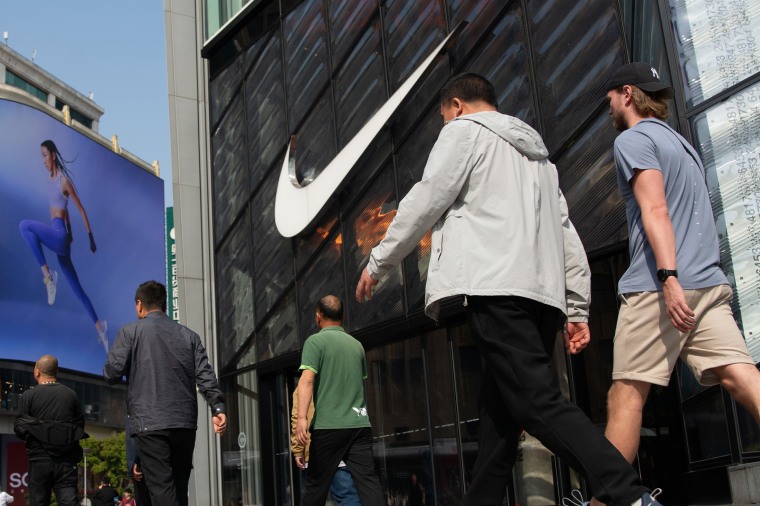HONG KONG — China said Tuesday it will “fight to the end” if President Donald Trump imposes an additional 50% tariff on Chinese goods as many countries rush to negotiate trade with the United States.
If the plan is fully implemented, the total tariffs on goods imported into the United States from China would be as much as 104%. In response, the Chinese Commerce Ministry said China “firmly opposes” Trump’s tariff threats, calling its previous countermeasures “entirely justified.”
“If the U.S. insists on its own way, China will fight to the end,” the ministry said in a statement Tuesday, adding that Trump’s threat to escalate tariffs on China is a “mistake upon a mistake.”
Trump threatened the new 50% duty on China, effective Wednesday, if Beijing does not withdraw its 34% tariffs on all U.S. goods by Tuesday, which China imposed in retaliation for a 34% levy on Chinese goods the Trump administration announced last week.

“Additionally, all talks with China concerning their requested meetings with us will be terminated!” Trump wrote Monday on Truth Social. “Negotiations with other countries, which have also requested meetings, will begin taking place immediately.”
Beijing’s retaliatory tariffs are scheduled to take effect Thursday.
“I believe the actions of the U.S. side do not reflect a willingness to engage in serious dialogue,” Lin Jian, a spokesperson for the Chinese Ministry of Foreign Affairs, said Tuesday at a regular briefing in Beijing.
The U.S. should “adopt an attitude of equality, respect and reciprocity” if it “truly wants to negotiate,” Lin said.
The Commerce Ministry urged the United States to cancel all unilateral tariff measures against China and resolve trade disputes through dialogue.
“Pressure and threats are not the correct way to deal with China,” it said. “China reiterates that there are no winners in a trade war, and protectionism leads nowhere.”
“China will resolutely take countermeasures to safeguard its own interests,” it added.
Stocks in mainland China and Hong Kong rose Tuesday as Beijing scrambles to stabilize its markets amid panic over Trump’s tariffs, with Chinese state-backed funds pledging to buy local stocks.
The Hang Seng Index in Hong Kong had climbed about 1.5% at the close of trading on Tuesday, a day after its biggest single-day decline in nearly three decades following China’s tariff retaliation against the U.S. China’s blue-chip CSI 300 Index closed up 1.7% after plummeting 7% on Monday.
State money is “more like a short-term stabilization gesture,” said Gary Ng, senior economist for Natixis in Hong Kong. But it’s “unrealistic,” he said, to expect China to inject state-owned funds into its stock market indefinitely if the trade war with the U.S. escalates.
China will hit back at Trump with the same 50% duties if he proceeds with his threat, said Andy Xie, an independent economist in Shanghai.
“If Trump wants to take you to hell, you take him with you,” Xie said of China’s possible response in a phone interview Tuesday.
Xie said he thinks Beijing has concluded that compromise will only lead to more pressure from Trump. “China cannot back down anymore,” he said.
Trump’s 50% tariff threat doesn’t make a lot of difference, Xie added, as Chinese goods already face more than 70% in U.S. duties accumulated since Trump’s first term.
China has decreased its dependence on the American market, with its exports to the U.S. dropping to 14.7% in 2024, down from 19.2% in 2018 when Trump started a trade war with the world’s second-largest economy, according to the country’s state-run People’s Daily newspaper.
“China [and] the United States will decouple. It’s a matter of time,” Xie said. “You have to bite the bullet.”
Trump said Sunday that China could get a reduction in tariffs if it approves a deal to sell TikTok’s U.S. operations. He confirmed reports that China and the United States had been “pretty close” to a deal over the video-sharing app but that Beijing backed out because of the new 34% U.S. tariff.
“If I gave a little cut in tariffs, they’d approve that deal in 15 minutes, which shows you the power of tariffs,” he told reporters on Air Force One.
However, the president seemed to backtrack on Monday, saying that he is not looking to pause his tariffs on China before they go into effect Wednesday, despite turmoil in the stock market and global economic fears.
